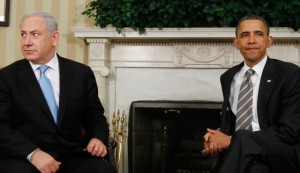By: Charles Ayers
Since its founding in 1948, the state of Israel has largely enjoyed the moral and material backing of the West, particularly from its most important partner the United States. However, the bedrock of support Israel has come to expect from these nations appears unstable, as political perspectives of Israel legitimacy and morality transform. There are increasingly overt signals indicating a broad transformation of the historic relationship between the United States, Europe, and Israel. Examples include the increasing recognition of organizations like the Boycotts, Divestment, and Sanctions (BDS) campaign, the statements of political leaders such as President Obama, and the growing receptiveness towards Palestinian efforts to precipitate debate in international bodies.
The reelection of Israel Prime Minister Benjamin Netanyahu has highlighted these tensions. The Prime Minister has a now infamously poor relationship with President Obama, and their disagreements over the Israel-Palestine peace process have hurt Israel’s relationship with America’s political left. This was demonstrated in March during the controversy over Netanyahu’s address to Congress, which a large number of Democratic lawmakers boycotted. As unconditional support for Israel has been a bipartisan issue in American politics for years, these developments speak to the increasingly fraught nature of the relationship. Netanyahu’s new conservative coalition, already courting controversy with the now aborted plan to segregate West Bank buses, seems an unlikely candidate to regain liberal America’s confidence and support.
American support for Israel seems especially precarious among young adults. According to a 2014 Gallup poll, sympathy for Israel among 18 to 34 year olds hovered at 52%, as compared to 58% and 74% among 35 to 54 year olds and individuals above 55 respectively. These generational perspectives are increasingly on display on college campuses, where the BDS campaign has gained traction in recent years. There are now groups in hundreds of major US colleges calling for administrations to divest from Israeli corporation, especially those linked to the occupation of the West Bank. Pro-Israel student groups have frequently accused the organization and individuals associated with the movement of anti-Semitism, claiming that by unfairly targeting Israel BDS is fostering a negative culture hostile to Jewish students. However, support for the campaign, especially since the most recent Gaza conflict, seems to be growing.
There is also increasing calls for recognition of a Palestinian state, especially in international organizations. In 2012, Palestinian gained nonmember, observer-state status at the UN, and its leaders have since only increased their diplomatic blitz for international support. A recent success is the Vatican’s formal recognition of the “state of Palestine”. Another was Palestine’s admittance to the International Criminal Court, where it plans open proceedings against Israel. Palestine even recently tried to have Israel expelled from FIFA. In addition, several European parliaments, such as in Britain and France, have passed resolutions calling for recognition of the Palestinian state. The EU itself seems to be considering punitive economic measures if Israeli settlement building continues.
As support for Israel declines while recognition of Palestine becomes more widespread, there appear to be signs of a sea change in international perspectives on the peace process. The claim Netanyahu made during his election suggesting that he would not allow the creation of an independent Palestine during his time in office (he has since walked back on this statement) has increased doubts in Israel’s commitment to a negotiated two-state solution. Reports have emerged that France is quietly gathering international support for a UN Security Council resolution that would impose an 18-month deadline on diplomatic negotiations leading to a Palestinian state. While US officials have lobbied for the motion’s suppression until after the nuclear negotiations with Iran are concluded, the Obama administration has not called on France to end its efforts. These developments have led many to conclude that the United States is gearing up for a historic abstention in the coming vote, ending decades of diplomatic cover for Israel in the UN. Such a stunning reversal would constitute a clear repudiation of current Israeli policy by its traditional allies, and increase Israel’s chances of becoming an international pariah should it defy such a resolution.
Photo Credit: AP Photo

